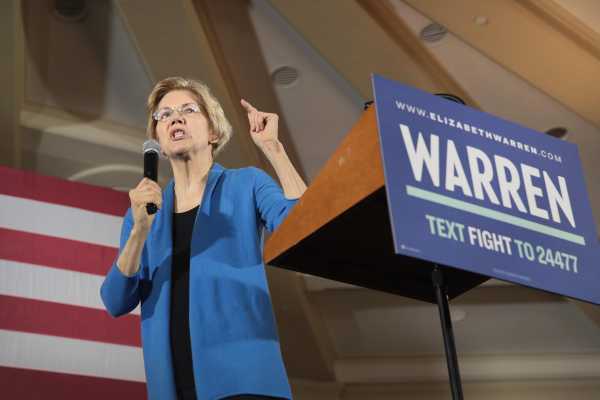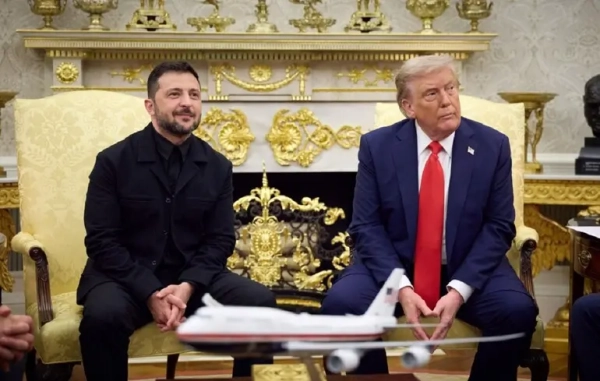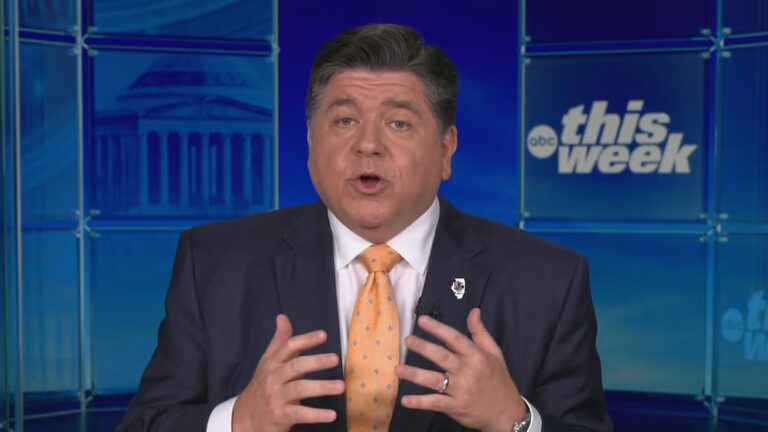
Sen. Elizabeth Warren is swearing off high-dollar fundraisers and receptions and phone calls with wealthy donors as part of her 2020 presidential run. The move is a challenge to her fellow competitors, as well as a test for the Massachusetts Democrat’s own campaign.
In an email to supporters and a subsequent post on Medium on Monday, Warren announced she plans to forgo some traditional routes of political fundraising from wealthy donors in her presidential bid. She won’t hold fundraisers with people who can write big checks, grant special access depending on donation size, or personally call wealthy donors to ask for their support.
“For every time you see a presidential candidate talking with voters at a town hall, rally, or local diner, those same candidates are spending three or four or five times as long with wealthy donors — on the phone, or in conference rooms at hedge fund offices, or at fancy receptions and intimate dinners — all behind closed doors,” she wrote.
Warren declared that her presidential primary campaign “will be run on the principle of equal access for anybody who joins it.”
She added that doing this in the primary will help her to “build the kind of grassroots organization we need to win the general election,” and in the general, she will “do what is necessary” to match Republicans financially. In other words, her self-imposed rules might change.
Warren, who was the first big-name Democrat to throw her hat into the ring in the 2020 Democratic primary, has already said she won’t sanction support from a Super PAC or accept corporate or any PAC money. (Many other Democrats have also said no on corporate PACs.) She has also said she won’t take money from federal lobbyists.
In this latest maneuver, Warren is looking to set herself apart from some of her primary opponents, such as Sens. Kamala Harris (CA) and Cory Booker (NJ), who will lean on both small-dollar and high-dollar donors, as is typical for a lot of political campaigns. Even Sen. Bernie Sanders (I-VT) in the 2016 primary took part in fundraisers.
At the same time, Warren is also potentially leaving millions on the table. She doesn’t have the small-dollar army to rival Sanders — at least not yet — and is making a bit of a risky bet.
Most campaigns use all the tools in the toolkit
Many Democrats find themselves in a tricky position when it comes to fundraising: On the one hand, there is a lot of energy and attention on grassroots fundraising on the left, and on the other, election laws are set up to allow for a lot of big money in politics, and deciding not to play by the current rulebook may mean missing out on a lot of funds.
“Money in politics isn’t going anywhere anytime soon,” Adam Parkhomenko, a Democratic strategist who served as the national field director for the Democratic National Committee in 2016, told me recently with regard to the big money debate in politics. “I don’t think there’s any reason why any Democrat needs to unilaterally disarm when it comes to fundraising.”
As Politico notes, Barack Obama in 2008 said he wouldn’t take money from PACs or federally registered lobbyists, but he still didn’t cut off access to high-dollar donors. And Obama in 2012 and Hillary Clinton in 2016 accepted backing from outside Super PACs in the wake of the 2010 Citizens United decision, which opened the door to outside spending.
Warren’s 2020 primary opponents seem to be making a similar calculation that while small-dollar donations are important, high-dollar fundraisers still need to be part of the equation as well. Sens. Kirsten Gillibrand and Harris have already reportedly taken part in or plan to take part in big-money fundraising receptions. As Recode’s Teddy Schleifer reported last week, Booker took part in a number of fundraising events in California last week.
It appears Warren’s decision is, in part, a challenge to her opponents to potentially follow suit. She alluded to that point in an interview with MSNBC’s Chris Hayes on Monday evening.
“We have a chance right now in a Democratic primary — we’re in a primary, it’s Democrats against Democrats — to say, ‘Here’s how we’re going to do this. We’re going to build from the grassroots, we’re actually going to build a foundation for the Democratic Party that is really about face-to-face, person-to-person, neighbor-to-neighbor, people who are engaged in this campaign,’” she said.
But Warren clarified that this is a decision she’s made for the primary — in the general election, for herself or whoever the Democratic nominee is, it will likely change.
“I do not believe in unilateral disarmament,” she said.
This is a little risky for Warren
Grassroots and online fundraising are expected to be a major focus of the 2020 Democratic primary. Harris’s campaign touted that it had raised $1.5 million within 24 hours of her campaign launch. Sen. Amy Klobuchar’s campaign celebrated raising $1 million in 48 hours, and Sanders’s campaign raised $6 million within 24 hours of launching his bid. Candidates will have to meet a small-dollar donation threshold for participating in primary debates.
Still, Warren’s decision may very well come at a cost. She will still accept checks up to the maximum for the cycle, $2,800, but because she’ll be avoiding events where those types of checks are often written, she probably won’t bring in as many.
As the Washington Post notes, Warren has had some issues with fundraising already. This latest decision could complicate the situation even further. Or it could be used as cover when her fundraising numbers are lower than expected.
Still, Warren appears determined to go ahead with this plan, at least for the primary. She’s pitching it as a way to set a better foundation for 2020.
“Think about the difference, once we’re down to the two candidates, if the Democrats have spent the next year in a primary building this thing face-to-face, person-to-person, neighbor-to-neighbor across the country; think of the foundation that we have laid down so that when we’re really up against it in the general election,” she told Hayes. “It’s not just money to fund television ads — it’s all the folks who will do the door-knocking, it’s all the folks who will make the phone calls, it’s all the folks who will reach out to their network.”
The news moves fast. Catch up at the end of the day: Subscribe to Today, Explained, Vox’s daily news podcast, or sign up for our evening email newsletter, Vox Sentences.
Sourse: vox.com






